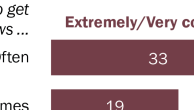One major trend of the last year is the emergence of private, local ownership groups returning to a prominent place in the newspaper industry. It appears that in several cities these private interests value newspapers more highly than the publicly traded equity markets, such as shareholders on the New York Stock Exchange.
The most dramatic recent case is in Los Angeles, where several groups are now interested in buying the Los Angeles Times, or in some cases its parent, the Tribune Co. Private owners or aspiring ones also have emerged in Boston, Hartford, Baltimore, Philadelphia, Akron and elsewhere.
For the most part, however, these new private buyers are different than the patriarchal local publishers of the past. People like music mogul David Geffen in Los Angeles, or former General Electric CEO Jack Welch in Boston, made their mark and their fortune in other businesses. In this sense, they are similar to modern owners of sports teams, rich folk who then enter into the sports ownership business as a second act in life. That is a departure from the earlier newspaper patriarchs, such Adolph Ochs, Joseph Pulitzer or E.W. Scripps, for whom journalism—and the tough-minded independence of the news—were the source of both their fortunes and their legacies.
What follows is a rundown of the different private groups who have either bought or are seeking to buy papers in 2006.
Los Angeles, CA
Eli Broad and Ron Burkle, suitors for the Tribune Co.
Billionaire investors Eli Broad and Ron Burkle submitted a bid on Nov. 8 to buy the Tribune Co., which, among many other holdings, owns the Los Angeles Times, KTLA Channel 5 in Los Angeles, and the Chicago Cubs.The bid came a day after Los Angeles Times editor Dean Baquet lost a battle to resist job cuts and was fired. Details about the offer and price have not been released.
Broad made his initial fortune in real estate at his company Kaufmann & Broad (now KB Home). He was also a founder and the CEO of the financial giant Sun America, which is now a subsidiary of the American International Group until 2000.His estimated current net worth is around $5.8 billion, and he is ranked by Forbes as the 42nd richest person in America.Broad is also well known for his philanthropy, including the endowment of the Eli Broad College of Business at his alma mater Michigan State University, the Broad Institute of MIT and Harvard, and the Broad Foundation (a K-12 public education program).
Burkle is a supermarket billionaire who founded Yucaipa Cos. in 1986, a holding company that invests in supermarket chains.His personal wealth is estimated to be over $2 billion. He is also part owner of the Pittsburgh Penguins. Burkle is a well-known political contributor and longtime Democratic fundraiser who is a close friend of Bill Clinton’s and who helped finance Al Gore’s cable TV network. He has also given over $200,000 to California Governor Arnold Schwarzenegger. Burkle has made previous attempts to buy newspapers. In February, through Yucaipa Cos., Burkle joined forces with union workers at nine Knight Ridder Inc. newspapers in an effort to buy the chain, but it was eventually sold to the McClatchy Co.
Broad has reportedly told friends that he has no interest in becoming publisher of the Times and that if he and Burkle win control of the paper it’s possible it would be run by a nonprofit trust.“I would not be an activist owner,” he told KABC. “I’m not a newspaper person, other than a reader.”
According to the Los Angeles Times, the duo’s main goal is to reestablish local ownership of the L.A. Times, which has lost two publishers and two editors in as many years in battles over staff cuts with Tribune.Both Broad and Burkle have said that local ownership would be a way to avoid staff reductions. According to another L.A. Times article, they and a separate suitor (David Geffen) have vowed that the newspaper would benefit from their ownership because they would be willing to accept lower profits and to invest in news coverage.
Maurice R. Greenberg, suitor for the Tribune Co.
Goldberg, 81, is a former chairman and CEO of American International Group (AIG), the world’s largest insurance and financial services corporation.He is currently chairman and CEO of C.V. Starr, Inc., a diversified financial services firm with assets of $3.5 billion.According to Reuters, he has been speaking to investment bankers and lawyers about pursuing the offer to buy all of the Tribune Co.Greenberg spokesman Mark Corallo confirmed Greenberg’s interest in media companies on November 13, but declined to elaborate.“Mr. Greenberg is exploring several options involving media companies,” Corallo said. “But we cannot get into details.”Goldberg has also expressed interest in buying the Boston Globe and Dow Jones Co.
David Geffen, suitor for the Los Angeles Times
Entertainment mogul David Geffen wants to own the Los Angeles Times (not all of the Tribune Co.).Geffen is the creator of Geffen Records and co-founder of the Dream Works SKG studio and is estimated by Forbes magazine at $4.6 billion.Geffen, 63, became a millionaire by the time he was 25.He has also donated billions to charity, including $200 million to the UCLA medical school.He wants to buy the paper himself rather than as part of a group, but according to a L.A. Times article he is concerned that the Tribune Co. may expect too high a price.He has been selling parts of his art collection recently, and some unnamed observers have speculated that the proceeds will be used in the battle over the L.A. Times.
Geffen, according to those familiar with the situation who spoke to PEJ, has met with Times news executives, past and present, who have reported back positive messages to the troops. Yet his own history with the media has often been rocky and aggressive.
As of November 15, 2006, Geffen reportedly had not submitted an offer, but he has spoken about how he wants to improve the newspaper.According to press accounts, he would like to upgrade the paper’s look and its coverage of the arts, among other things.He’d also like to get New York Times columnist Maureen Dowd to join the LA Times, according to one L.A. Times article.One unnamed investor told the paper, “He seems to care deeply about it and to be working at it.”
One wrinkle, according to press accounts, is that Broad and Geffen dislike each other, which intensifies the competition between them for the paper even more.
Private investment firms, suitors for the Tribune Co.
In addition to these three private groups in Los Angeles, there are at least four bids from private investment firms for ownership of the whole Tribune Co.: Bain Capital, Carlyle Group, a partnership of Texas Pacific Group and Thomas H. Lee Partners, and an alliance of Providence Equity Partners, Madison Dearborn Partners and Apollo Partners.
Hartford, CT
The Chase family, suitors for The Hartford Courant (owned by Tribune Co.)
The Chase family, commercial real estate developers in Connecticut, sent a letter of interest to Tribune on Sept. 26 about buying the Hartford Courant, according to the Associated Press.“My father has definitely expressed an interest,” Chase Enterprises Chief Executive Cheryl Chase said. “If the paper were to go on the market, he definitely has expressed an interest in trying to get a group together to buy it. Now, how realistic that is in today’s day and age, I don’t know.”
Chase also said her father has spoken informally with other potential investors enthusiastic about the prospect of buying the paper. “When you’re dealing with a smaller group and a locally based group, and not a public company, you’re not driven by shareholder needs and watching the stock all the time, which I think would be a benefit,” she said.
Baltimore, MD
Ted Venetoulis, suitor for the Baltimore Sun (owned by Tribune Co.)
Democrat and former Baltimore County executive Ted Venetoulis and his group, the Baltimore Media Group, which includes 15-20 civic and business leaders, announced on October 27 that they want to buy the Baltimore Sun.Venetoulis told the Washington Post that he’s hoping to return the paper to private ownership to restore some of the quality that has been lost over the years as a result of increased budget concerns.“Everyone (in the investment group) needs to understand this may not be the best business venture around and the return may not be what they expect,” he said.“This is part civic responsibility.” He insisted that the group will not jeopardize the paper’s independence or try to give it a certain ideological bent.
Boston, MA
John F. Welch Jr. and Jack Connors, suitors for the Boston Globe, owned by the New York Times Co
Welch was Chairman and CEO of General Electric for two decades, from 1981-2001. During that time, he increased G.E.’s market value by more than $400 billion and became something of a legendary CEO.Connors is a co-founder of the ad agency, Hill Holiday, which also has handled the Globe’s advertising account, according to a Boston Globe article. The two started working with the investment bank JPMorgan Chase & Co. to analyze a potential deal in late October.According to the Boston Globe, both are looking to assemble a small group of local business people for a bid that would include debt and equity. Each man has reportedly tentatively committed $25 million to the deal. However, the Times Co. has said repeatedly that the Globe, despite its poor financial results, is not for sale, according to the same Boston Globe article.
An unnamed person close to Welch said he had been “looking for something to sink his teeth into for a long time,” and in recent weeks he and his wife, Suzy Welch, a former editor of The Harvard Business Review, had become “enamored” of the idea of owning The Globe, according to reports in the New York TimesThe duo see “buying the Globe as a civic investment as much as a financial one,” say the executives involved in the effort. According to a Globe article, “Welch and Connors hope to return the paper to its community roots and stem continuing cutbacks in the editorial budgets and losses in advertising and circulation.”
Philadelphia, PA
Brian Tierney and Philadelphia Media Holdings L.L.C., new owner of the Philadelphia Inquirer
Brian Tierney is a Philadelphia businessman and former Republican activist.He is the chief executive of Philadelphia Media Holdings L.L.C., and the publisher of The Philadelphia Inquirer and The Philadelphia Daily News.Tierney founded Tierney Communications, a public relations firm, in 1989. In March 2006 Tierney assembled a group of mostly former clients and people with him on the board of the Episcopal Academy School to buy Philadelphia Newspapers Inc. He and other local businessman formed Philadelphia Media Holdings L.L.C. and bought The Philadelphia Inquirer, Philadelphia Daily News and philly.com for $562 million in May from The McClatchy Company, which was selling off less profitable newspapers acquired in its purchase of Knight Ridder.“The next great era of Philadelphia journalism begins today,” Tierney said at the time.“We want to grow these publications, not try to manage the decline.”
Tierney’s investor group in the company include some of Philadelphia most prominent business people, among them, according to the Inquirer: Bruce E. Toll, vice chairman of Toll Brothers Inc. and owner of two car dealerships and other investments, who is reportedly the largest investor; William Graham, chief executive of the Graham Company, a commercial and government insurance broker who said he invested around $20 million; The Carpenters’ Pension and Annuity Fund of Philadelphia and Vicinity which invested more than $25 million of its $1.3 billion portfolio. Additional investors include Leslie A. Brun, chairman emeritus of Hamilton Lane Advisers; Katherine D. Crothall, former chief executive of Animas Corp., a West Chester medical equipment maker; Michael Hagan, former Internet entrepreneur and chairman of NutriSystem Inc., which counts Tierney among its investors; and Patricia Harron Imbesi, heir to a cable TV fortune and principal of Patriarch Media LLC.
Since acquiring the papers, the financial situation has been difficult. In a recent memo to employees, Tierney said layoffs are “unavoidable” and business conditions have slipped to the point that the new owners will have trouble “meeting our bank obligations” if costs aren’t cut.The Philadelphia newspapers are an indication of some of the risks of going private.“You have a much bigger mortgage payment and you absolutely have to make your numbers,” Alan D. Mutter, a former newspaper editor who is managing partner of a San Francisco investment firm, told the Sacramento Bee.
On November 8, as he was explaining the planned cutbacks, Tierney also replaced Amanda Bennett, the editor of The Philadelphia Inquirer, with William K. Marimow, a former Pulitzer-Prize-winning reporter for The Inquirer, and top news executive with NPR. Marimow himself had been replaced as editor of the Baltimore Sun after clashing with Tribune Co. over its planned cutbacks in that newsroom.
Wilkes-Barre, PA
Richard Connor and HM Capital Partners, owner of the Wilkes-Bare Times Leader
Connor served as President and Publisher of the Times Ledger 1978-1986 and is chairman of Texas Community Newspapers, based in Fort Worth, TX. HM Capital Partners is a buyout firm that typically targets underperforming companies in specific niches (including media-related enterprises like Clear Channel Communications, Marcus Cable Company, and LIN Television Corporation), builds them up, and sells them or spins them off in IPO’s.
The duo bought the Times Leader on June 26 for $165 million. Connor said at the time of the sale, “We are excited by the opportunity to continue the tradition of solid journalism that has been practiced here for many years and to remain a committed member of the community. Wilkes-Barre has been and will remain a great newspaper town.” Gary Pruitt, Chief Executive Officer of McClatchy (which was selling the Times Leader) said, “This sale represents a win for all the stakeholders: readers, advertisers, employees and the community of Wilkes-Barre. We were particularly pleased to find buyers with community roots and direct experience with the Times Leader. Experienced management and committed owners will serve them well.”
In a recent column in the paper, Connor wrote that the Times Leader in September enjoyed a substantial increase in profits over the previous year and its advertising revenues increased over that period.
Akron, OH
David Black, owner of the Akron Beacon Journal
Black is the chief executive officer of Black Press Ltd., a company that is 80 percent owned by the David Black family and 20 percent owned by the Torstar Corp (an independently-owned Canadian publishing company that is named after its principal holding, the Toronto Star daily newspaper).Black is also the owner of the Honolulu Star-Bulletin.Black Press Limited bought the Akron Beacon Journal, a former Knight-Ridder newspaper, from the McClatchy Co. for $165 million on June 7.The Beacon Journal, which is the only daily newspaper in Akron, Ohio, is Black Press’s largest holding.
“Under the direction of the Knight family, the Akron Beacon Journal has been a good community newspaper for a long time. We believe in the same focus on local journalism of high quality,” Black said.According to a Star-Bulletin report, Black sent a memo to Beacon Journal employees in which he promised no layoffs and to recognize the paper’s current labor unions, including the Newspaper Guild-CWA.But in early November, the Akron Beacon Journal reported that 85 positions in its newsroom had been eliminated in the past few months. It now employs 640 persons, including about 120 in the newsroom.
Duluth and Grand Forks, ND
Bill Marcil, owner of the Duluth News Tribune and the Grand Forks Herald
Marcil is the chief executive officer of Forum Communications, a multi-media company based in Fargo, ND. The company includes more than 30 daily and community newspapers, as well as broadcasting, interactive media and commercial printing in North Dakota, South Dakota, Minnesota and Wisconsin.Forum Communications bought the former Knight Ridder newspapers on June 7, 2006, from McClatchy Co.The two papers are North Dakota’s two largest newspapers. “The Grand Forks and Duluth papers are each great newspapers, with a strong heritage of committed journalism,” said Marcil in a statement.“They will fit well within our diverse group of integrated media properties.”No major changes or layoffs are expected under the new ownership.
Aberdeen, SD
Todd Schurz, Schurz Communications Inc., new owner of the Aberdeen American News
Schurz is the president and chief operating officer for Schurz Communications, a diversified and privately-owned media and communications company.Schurz Communications publishes twelve daily and six weekly newspapers in medium and small markets with a combined circulation of nearly 225,000, including the Herald Times (IN), and Morning Herald and Daily Mail (MD). It also owns four television stations, seven radio stations, two cable companies, phone directories, shopping guides, and a printing company. Geographically, Schurz Communications has a presence in Indiana, Kentucky, Maryland, Michigan, Pennsylvania, California, Florida, Missouri, Georgia and Virginia.
“We don’t assume we’re smarter than the people we’re buying the property from,” Schurz said.“We have a different time horizon.”Schurz, a fifth-generation member of his family to run the company, says he doesn’t plan to fire staff.“We don’t think in terms of quarters–we think in terms of generations.”
Contra Costa and Monterey, San Jose CA
St. Paul, MN
Dean Singleton, new owner of the Contra Costa Times, The Monterey Herald, the San Jose Mercury News and the St. Paul Pioneer Press
Singleton, a controversial character in the newspaper industry, is the founder, vice chairman and chief executive officer of MediaNews Group. The company, which has specialized in buying papers that publicly traded companies didn’t want, is now the fourth-largest newspaper company in the United States in terms of circulation, with 53 daily papers totaling 2.7 million subscriptions daily and 3 million on Sunday.
Singleton also serves as publisher of a number of MediaNews’ dailies, including the Denver Post, the Salt Lake Tribune and the Detroit News.
On April 26 he announced that MediaNews Group would purchase four of the “orphan 12” newspapers from the Knight Ridder-McClatchy deal, including the Contra Costa Times, Monterey Herald, St. Paul Pioneer Press, and San Jose Mercury News, for $1 billion. The acquisition was completed on Aug. 2, 2006.
Since then, the Contra Costa Times has eliminated jobs in several locations, with the cuts affecting every part of the publishing operation. On Oct. 20 the Mercury News announced that it would lay off 8.5 percent of its work force — 101 employees — by Dec. 19 as a long-running slide in revenues across the newspaper industry continues.
Fort Wayne, IN
Robert M. Nutting, Ogden Newspapers, new owner of the Fort Wayne News-Sentinel
Nutting is the CEO of Ogden Newspapers, a private family-owned company headquartered in Wheeling, W.V., which publishes 39 daily newspapers, as well as related web sites, telephone directories, weekly newspapers, shoppers, and magazines in 15 states.Financial terms of the June 27 transaction were not disclosed.The purchase covers the News-Sentinel, a 75% stake in the Fort Wayne Joint Operating Agency (JOA) and certain publications and web sites related to the newspapers.“As a family company, we’re especially pleased to be associated in the Fort Wayne JOA with another long-standing newspaper family,” Nutting said in a McClatchy Co. press release.




